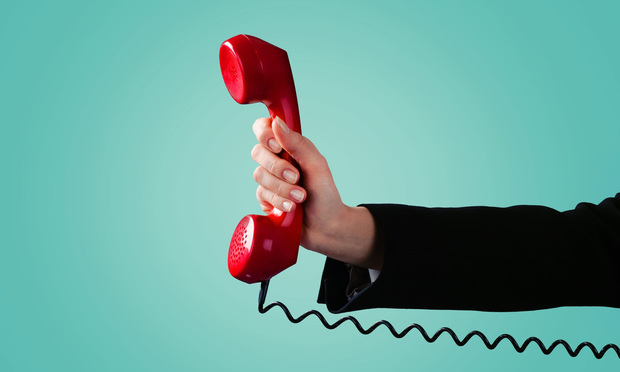Law Firms Rarely Have Policies About Lawyers Recording Phone Calls
The legality of recording phone calls without permission is one thing. The ethics of doing so is another.
April 13, 2018 at 03:54 PM
4 minute read

Law firms rarely issue guidance to their lawyers on whether they can record phone calls without disclosing they are doing so to the other parties on the line.
In the wake of The Washington Post's reporting that President Donald Trump's personal lawyer, Michael Cohen, regularly taped phone calls, questions have arisen about the practice. Legal ethics experts say law firms probably should issue such guidelines, but few, if any, do.
“This is an issue on which the national profession has not come to common agreement,” said Stephen Gillers, a professor at New York University School of Law and an authority on legal ethics.
Earlier this week, federal prosecutors seized Cohen's office files and computers as part of an investigation into allegations he made payments to women who had affairs with the president to keep them silent on the subject. Cohen, who previously had a strategic alliance with Squire Patton Boggs and was given an office on the firm's 23rd floor at Rockefeller Center, “was known to store the conversations using digital files and then replay them for colleagues,” according to the Post article, which attributed the information to people who interacted with Cohen.
Representatives at five Am Law 100 firms either did not respond or declined to comment when asked about their firms' policies and practices regarding lawyers recording phone calls.
 Stephen Gillers
Stephen Gillers The undisclosed taping of phone calls is, of course, prohibited if illegal. And it is illegal if the other party does not consent and the jurisdiction is a two-party consent jurisdiction.
California is a two-party consent jurisdiction. New York is not.
But on the ethics front, bar associations have issued a welter of conflicting opinions about the topic.
“In New York, an old State Bar opinion says taping without consent is unethical even if legal. The City Bar, in a more recent opinion, takes the position that it is almost always unethical and would be so if it were a routine practice. The County Bar takes the position that it is not unethical if legal in New York. The American Bar Association takes the position that it is not forbidden by the Model Rules,” Gillers wrote in an email.
Gillers says that law firms, in order to protect themselves, should have a policy of forbidding taping except in narrow circumstances where it can be justified, such as when there is reason to believe that the other party is engaging in threatening behavior or inviting a bribe.
“Even then, the firm has to be sure the taping is legal and ethical in the jurisdiction. And no lawyer should be allowed to make this decision on his or her own in the lawyer's own case. The decision should be made by a member of the executive or ethics committee. There should be a writing explaining the justification,” he wrote.
 Laurie Levenson
Laurie Levenson Laurie Levenson, a professor of law at Loyola Law School in Los Angeles, agreed that firms should have policies limiting undisclosed taping. But she noted that most firms don't have those policies. “It is problematic,” she said.
Ronald Minkoff, a partner at Frankfurt Kurnit Klein & Selz who leads the firm's professional responsibility group, agreed that few, if any, firms have issued formal policies limiting lawyers' taping of calls unbeknownst to the other parties on the phone.
But he said firms most likely have not issued written rules about taping because few lawyers would even think of taping calls in that manner, and certainly not as part of their daily routine.
But there are the rare lawyers who do regularly tape conversations, Minkoff said.
 Ron Minkoff
Ron Minkoff “I once worked in a firm where a partner routinely taped calls. You could tell him until the cows come home that what he was doing was not ethical and not proper,” he said. “It wouldn't have mattered.”
If questioned about his tactics, the taping-happy partner would reply: “'What better source do I have than a tape recording if they question me?'” Minkoff recalled.
Since New York laws don't forbid such taping and the bar associations have issued guidance pretty much all over the map, Minkoff doubts any lawyers are getting in trouble for taping there.
However, “if you have a standard policy of always taping, that may cause problems,” Minkoff said.
This content has been archived. It is available through our partners, LexisNexis® and Bloomberg Law.
To view this content, please continue to their sites.
Not a Lexis Subscriber?
Subscribe Now
Not a Bloomberg Law Subscriber?
Subscribe Now
NOT FOR REPRINT
© 2025 ALM Global, LLC, All Rights Reserved. Request academic re-use from www.copyright.com. All other uses, submit a request to [email protected]. For more information visit Asset & Logo Licensing.
You Might Like
View All

Strategic Pricing: Setting the Billable Hour at the Intersection of Psychology, Feedback and Growth

New Year, New Am Law 100: Challenges Await These Newly Merged Law Firms
7 minute read
Zuckerman Spaeder Gets Ready to Move Offices in DC, Deploy AI Tools in 2025
5 minute readTrending Stories
- 1US DOJ Threatens to Prosecute Local Officials Who Don't Aid Immigration Enforcement
- 2Kirkland Is Entering a New Market. Will Its Rates Get a Warm Welcome?
- 3African Law Firm Investigated Over ‘AI-Generated’ Case References
- 4Gen AI and Associate Legal Writing: Davis Wright Tremaine's New Training Model
- 5Departing Attorneys Sue Their Former Law Firm
Who Got The Work
J. Brugh Lower of Gibbons has entered an appearance for industrial equipment supplier Devco Corporation in a pending trademark infringement lawsuit. The suit, accusing the defendant of selling knock-off Graco products, was filed Dec. 18 in New Jersey District Court by Rivkin Radler on behalf of Graco Inc. and Graco Minnesota. The case, assigned to U.S. District Judge Zahid N. Quraishi, is 3:24-cv-11294, Graco Inc. et al v. Devco Corporation.
Who Got The Work
Rebecca Maller-Stein and Kent A. Yalowitz of Arnold & Porter Kaye Scholer have entered their appearances for Hanaco Venture Capital and its executives, Lior Prosor and David Frankel, in a pending securities lawsuit. The action, filed on Dec. 24 in New York Southern District Court by Zell, Aron & Co. on behalf of Goldeneye Advisors, accuses the defendants of negligently and fraudulently managing the plaintiff's $1 million investment. The case, assigned to U.S. District Judge Vernon S. Broderick, is 1:24-cv-09918, Goldeneye Advisors, LLC v. Hanaco Venture Capital, Ltd. et al.
Who Got The Work
Attorneys from A&O Shearman has stepped in as defense counsel for Toronto-Dominion Bank and other defendants in a pending securities class action. The suit, filed Dec. 11 in New York Southern District Court by Bleichmar Fonti & Auld, accuses the defendants of concealing the bank's 'pervasive' deficiencies in regards to its compliance with the Bank Secrecy Act and the quality of its anti-money laundering controls. The case, assigned to U.S. District Judge Arun Subramanian, is 1:24-cv-09445, Gonzalez v. The Toronto-Dominion Bank et al.
Who Got The Work
Crown Castle International, a Pennsylvania company providing shared communications infrastructure, has turned to Luke D. Wolf of Gordon Rees Scully Mansukhani to fend off a pending breach-of-contract lawsuit. The court action, filed Nov. 25 in Michigan Eastern District Court by Hooper Hathaway PC on behalf of The Town Residences LLC, accuses Crown Castle of failing to transfer approximately $30,000 in utility payments from T-Mobile in breach of a roof-top lease and assignment agreement. The case, assigned to U.S. District Judge Susan K. Declercq, is 2:24-cv-13131, The Town Residences LLC v. T-Mobile US, Inc. et al.
Who Got The Work
Wilfred P. Coronato and Daniel M. Schwartz of McCarter & English have stepped in as defense counsel to Electrolux Home Products Inc. in a pending product liability lawsuit. The court action, filed Nov. 26 in New York Eastern District Court by Poulos Lopiccolo PC and Nagel Rice LLP on behalf of David Stern, alleges that the defendant's refrigerators’ drawers and shelving repeatedly break and fall apart within months after purchase. The case, assigned to U.S. District Judge Joan M. Azrack, is 2:24-cv-08204, Stern v. Electrolux Home Products, Inc.
Featured Firms
Law Offices of Gary Martin Hays & Associates, P.C.
(470) 294-1674
Law Offices of Mark E. Salomone
(857) 444-6468
Smith & Hassler
(713) 739-1250









